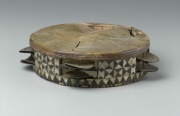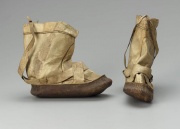Difference between revisions of "Fish skin"
Jump to navigation
Jump to search
| Line 13: | Line 13: | ||
== Additional Information == | == Additional Information == | ||
| − | ° H.Kuhn, ''Conservation and Restoration of Works of Art and Antiquities'', Butterworths, London, 1986. ° M.Kite, "The Conservation of a 19th Century Salmon Skin Coat" in ICOM Preprints, Lyon, 1999. p.691-696. | + | ° H.Kuhn, ''Conservation and Restoration of Works of Art and Antiquities'', Butterworths, London, 1986. |
| + | |||
| + | ° M.Kite, "The Conservation of a 19th Century Salmon Skin Coat" in ICOM Preprints, Lyon, 1999. p.691-696. | ||
== Comparisons == | == Comparisons == | ||
Revision as of 10:33, 15 January 2014
Description
Fish skins and sharkskins provide a close texture, impervious surface that have been used as abrasives for polishing veneer (Kuhn 1986). In northern Pacific regions, fish skins were also used for clothing, footwear, and waterproof covers for windows, boats, and sleds (Kite 1999).
See also Salmon skin, and Shagreen.
Synonyms and Related Terms
pele de peixe (Port.)
Additional Information
° H.Kuhn, Conservation and Restoration of Works of Art and Antiquities, Butterworths, London, 1986.
° M.Kite, "The Conservation of a 19th Century Salmon Skin Coat" in ICOM Preprints, Lyon, 1999. p.691-696.
Comparisons
Properties of Common Abrasives
Authority
- G.S.Brady, Materials Handbook, McGraw-Hill Book Co., New York, 1971 Comment: p. 332
- Hermann Kuhn, Conservation and Restoration of Works of Art and Antiquities, Butterworths, London, 1986
- Wikipedia, the free encyclopedia, at http://www.wikipedia.com Comment: http://en.wikipedia.org/wiki/Fish (Accessed Nov. 2, 2005)

